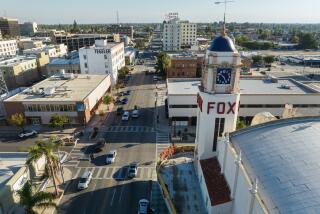2 Arrested for Alleged Cheating at Bell Club
Several months ago, retired dentist David Schiller bought 1,000 blue $1 chips from the Bicycle Club in Bell Gardens. He bleached out the color with acetone, police say, meticulously repainted them by hand and then, on Feb. 17, tried to cash some of the doctored chips for $25 and $100 apiece at the California Bell Club.
He was arrested outside the men’s room after trying to flush some of the bogus chips down the toilet.
The arrest of Schiller, 63, of Carlsbad--and another man, Paul William Gee, 49, of North Hollywood, in an unrelated incident--are the first in connection with alleged cheating at the Bell Club since the card parlor opened in September, 1980, Bell-Cudahy police detectives said.
Gee was arrested after he allegedly tried to rig a poker game earlier this month. While a friend distracted several other players seated around the poker table at the Bell Club, police say, Gee reached into his coat, pulled out his own deck of cards and switched it with the house deck on the table in front of him.
Switch Videotaped
His friend eventually won the $4,260 jackpot with Gee’s cards, but Gee was arrested after a hidden overhead video camera recorded the deck switch.
Schiller, a dentist for more than 35 years before retiring last year, was arraigned Tuesday in Huntington Park Municipal Court on three counts of grand theft. A preliminary hearing in the case is set for March 26.
Gee, a former employee of the Bell Club, was arrested Feb. 21 on suspicion of grand theft after police reviewed the videotape of the card deck switch. His arraignment is March 13 in Huntington Park Municipal Court.
Both Schiller and Gee are free on $5,000 bail. If convicted, the two men could each receive up to a year in prison.
“This is the first time I can remember that we’ve been called to handle a cheating case at the Bell Club,” said Bell-Cudahy detective Craig Junginger. “There may have been other instances (of cheating), but this is the first time we’ve been called in.”
Before his arrest, investigators said Schiller, who is divorced and lives alone in a modest apartment in north San Diego County, pocketed $4,600 by cashing in about 70 phony chips--$1 chips he had altered to look like $25 and $100 chips--at three Southeast-area card parlors: the Bicycle Club, the California Commerce Club in Commerce and finally the Bell Club.
All but about $300 was recovered, detective Dennis Tavernelli said.
‘Not a Bad Return’
“If all the chips had been changed to $100 and successfully passed, he would have made $100,000,” Tavernelli said. “Not a bad return on a $1,000 investment.”
Tavernelli said Schiller’s alleged scheme began to unravel when Commerce Club officials spotted the bogus chips on the morning of Feb. 17 and notified the other two clubs.
Poker chips come in different colors to signify varying dollar amounts. The chips also carry the name or logo of the club where they are purchased, and most clubs will cash chips from another club, although the colors may be different.
Police said Schiller purchased the blue $1 chips from the Bicycle Club, then stripped the paint with acetone. He then allegedly repainted them purple and white to look like $25 and $100 chips, leaving the Bicycle Club’s name in the center of the chip.
But because Schiller did the work by hand, Tavernelli said the paint job on some was “sloppy and fairly easy to detect” and some of the fake chips were wider than normal because he used extra layers of paint. The paint Schiller used also rubbed off when wet.
Discrepancies Noticed
The discrepancies were again spotted later that day when Schiller tried to cash more of the bad chips, this time at the Bell Club.
When Schiller handed several of the chips to a club cashier, she disappeared and failed to return right away. Schiller then went to the men’s room, where he tried to flush the rest of his chips down the toilet, several Bell Club employees said in interviews Tuesday.
“When he came out of the bathroom without the chips, we detained him and called police,” said Josephine Dabao, the club’s general manager. “The toilet bowl was full of the chips.”
A search of his car turned up more of the fake chips, and the next day police searched Schiller’s apartment and found tools, paints and chemicals used to alter the poker chips, polcie said. “He did it all by hand,” Tavernelli said. “It was a long and tedious process.”
In the second case, investigators allege Gee rigged a game of “jackpot” low-ball poker on the night of Feb. 13 by switching decks. Junginger said police are searching for at least two others--the dealer and the winner of the game’s $4,260 jackpot--in connection with the case.
In California poker clubs, there is no house; the players bet against one another, paying into a jackpot at the beginning of each hand. The clubs act as hosts and take their profits from a percentage of the money wagered. The clubs provide dealers, who shuffle, deal and collect cards at every table.
Sitting Next to Dealer
Police say when Gee allegedly switched decks he was sitting next to the dealer.
“Normally, the dealer sets the cards directly in front of him,” Junginger said. “But this dealer put them down on his left within reach of Gee. When a second player (the game’s eventual winner) across from Gee made a minor commotion that distracted the other players, Gee made the switch.”
As he removed the house deck with his right hand, Gee slipped his deck on the table with his left hand, Junginger said.
In his haste, however, Gee left his deck face up on the table, a blunder, Junginger said, that was spotted by club operators who were monitoring the game from a video camera hidden behind a panel in the ceiling.
Games with jackpots higher than $3,000 are routinely videotaped, Junginger said.
Police said it is unclear whether the other players at the table were aware of the deck switch.
After reviewing the tape, Junginger said club officials questioned the game’s seven players, five of whom were off-duty club employees. All five were fired, as was the dealer, although there is no policy against off-duty employees playing games at the club. Club officials then called in police.
More to Read
Start your day right
Sign up for Essential California for news, features and recommendations from the L.A. Times and beyond in your inbox six days a week.
You may occasionally receive promotional content from the Los Angeles Times.






